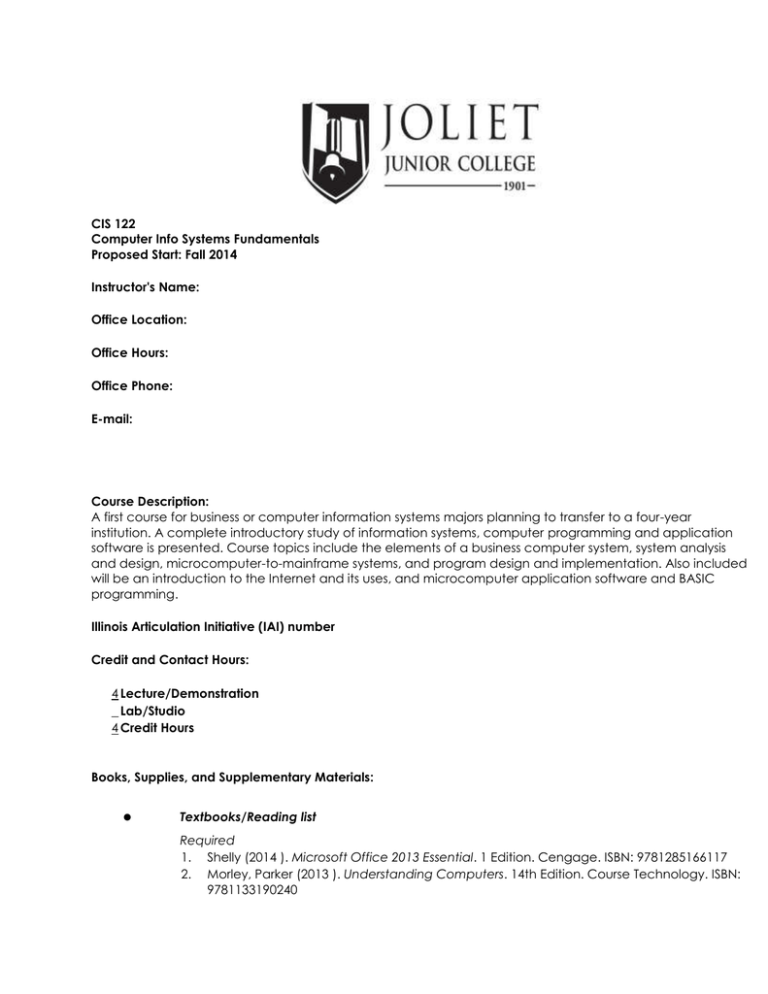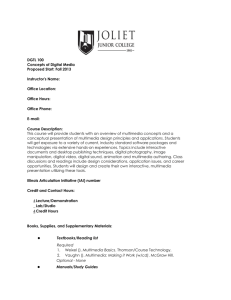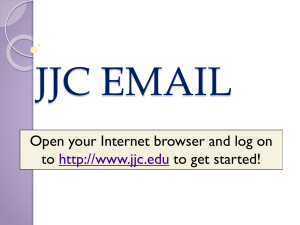CIS 122 Computer Info Systems Fundamentals Proposed Start: Fall 2014 Instructor's Name:
advertisement

CIS 122 Computer Info Systems Fundamentals Proposed Start: Fall 2014 Instructor's Name: Office Location: Office Hours: Office Phone: E-mail: Course Description: A first course for business or computer information systems majors planning to transfer to a four-year institution. A complete introductory study of information systems, computer programming and application software is presented. Course topics include the elements of a business computer system, system analysis and design, microcomputer-to-mainframe systems, and program design and implementation. Also included will be an introduction to the Internet and its uses, and microcomputer application software and BASIC programming. Illinois Articulation Initiative (IAI) number Credit and Contact Hours: 4 Lecture/Demonstration Lab/Studio 4 Credit Hours Books, Supplies, and Supplementary Materials: • Textbooks/Reading list Required 1. Shelly (2014 ). Microsoft Office 2013 Essential. 1 Edition. Cengage. ISBN: 9781285166117 2. Morley, Parker (2013 ). Understanding Computers. 14th Edition. Course Technology. ISBN: 9781133190240 Optional - None • Manuals/Study Guides Required - None Optional - None • Periodicals Required - None Optional - None • Software Required - None Optional - None • Supplementary materials 1. flash storage device Methods of Instruction: Student Learning Outcomes: Course Content Outcomes 1. Discuss the meaning and function of hardware, software, data, procedures, and personnel, as related to the successful implementation and use of business computer systems. 2. Discuss the concepts of Systems analysis and design and their applications in developing computer systems. 3. Use current file processing techniques and database concepts. 4. Produce programming assignments in a structured language to support common business applications. Through these exercises, the student will develop skills in programming, which may be used for personal gain or may be used as tools in other academic classes. 5. Use business application software currently available. Topics will include database management, spreadsheets, graphics, word-processing, and data communications with electronic mail. 6. Tell the origin and nature of the Internet, including electronic mail. 7. Discuss management information systems, decision support systems, expert systems, and information resource management systems, as they are used to meet the evolving information requirements of business. 8. Analyze the societal impact of business computer systems and future trends in the field of information processing. General Education Student learning outcomes: Students will demonstrate competence in using academic technology including finding, evaluating and utilizing appropriate information sources. Students will demonstrate an ability to think critically and analytically. Graded assignments and policies: Graded Assignments 16 chapter essay/shore answer assignments. 16 discussion assignments - 3 postings each. 16 matching assignments. 2 Office - general assignments. 4 Word assignments. 4 Excel assignments 4 Access assignments 4 PowerPoint assignments 2 Integration assignments. 1 programming project consisting of general programming concepts. Grading policy A = 90 - 100% B = 80 - 89% C = 70 - 79% D = 60 - 69% F < 60% Major Tests and Quizzes 16 chapter quizzes Mid-term Final exam Classroom Policies and Procedures A. General Information B. Attendance Policy C. Make-up Policy D. Extra-credit Policy E. Final Exam Information F. Academic Honor Code The objective of the academic honor code is to sustain a learning-centered environment in which all students are expected to demonstrate integrity, honor, and responsibility, and recognize the importance of being accountable for one's academic behavior. G. College Statement about grades of 'F' and withdrawal from class o Students may withdraw from a course by processing an add/drop form during regular office hours through the Registration and Records Office at Main Campus or Romeoville Campus, or by phone at 815-744-2200. Please note the withdrawal dates listed on your bill or student schedule. Every course has its own withdrawal date. Failure to withdraw properly may result in a failing grade of 'F' in the course. o At any time prior to the deadline dates established, an instructor may withdraw a student from class because of poor attendance, poor academic performance or inappropriate academic behavior, such as, but not limited to, cheating or plagiarism. H. Intellectual Property Students own and hold the copyright to the original work they produce in class. It is a widely accepted practice to use student work as part of the college's internal self-evaluation, assessment procedures, or other efforts to improve teaching and learning and in promoting programs and recruiting new students. If you do not wish your work to be used in this manner, please inform the instructor. I. Student Code of Conduct Each student is responsible for reading and adhering to the Student Code of Conduct as stated in the college catalog. J. Sexual Harassment Joliet Junior College seeks to foster a community environment in which all members respect and trust each other. In a community in which persons respect and trust each other, there is no place for sexual harassment. JJC has a strong policy prohibiting the sexual harassment of one member of the college community by another. See Catalog or Student Handbook. K. Student Support http://jjc.edu/services-for-students/pages/default.aspx a. Disability Services: http://jjc.edu/services-for-students/disability-services/Pages/default.aspx. Student Accommodations and Resources (StAR): If you need disability-related accommodations, specialized tutoring, or assistive technology in this class, if you have emergency medical information you wish to share with me, or if you need special arrangements in case the building must be evacuated, please inform me immediately. Please see me privately after class or at my office. New students should request accommodations and support by scheduling an appointment with the Student Accommodations and Resources (StAR) Office, Campus Center 1125, (815) 280-2230. b. Tutoring: http://jjc.edu/services-for-students c. Counseling and Advising: http://jjc.edu/services-for-students/counseling-advising d. Academic Resources: http://jjc.edu/services-for-students/academic-resources e. Support Programs: http://jjc.edu/services-for-students/support-programs-services f. Technology Support: http://jjc.edu/services-for-students/Pages/technology-support.aspx L. Safety M. College Documentation Styles Course Outline Week Unit, Topic, Class Activity (Indicate approximate time allotment for each topic/unit) ** Laboratory projects (Word Processing, Database, Spreadsheet) are to be conducted on a weekly basis throughout the semester, with frequent excursions to the Internet. 1 Introduction to the World of Computers a. Computers in Your Life b. What is a Computer and What Does it Do? c. Computer Networks and the Internet d. Computers to Fit Every Need e. Computers and Society 2 Using Your PC, Windows, and the Web a. Starting Your Computer: The Boot Process b. Using the Windows Operating System c. Using the Internet and World Wide Web d. E-Mail and Other Types of Online Communications e. Societal Implications of Cyberspace 3 The System Unite: Processing and Memory a. Data and Program Representation b. Inside the System Unit c. How the CPU Works d. Making Computers Faster Now and in the Future Comments 4 5 6 7 8 9 10 Storage a. Properties of Storage Systems b. Magnetic Disk Systems c. Optical Disk Systems d. Other Types of Storage Systems e. Comparing Storage Alternatives Input and Output a. Input and Output b. Keyboards c. Pointing Devices d. Scanners and Related Devices e. Biometric Input Devices f. Multimedia Input Devices g. Display Devices h. Printers i. Multimedia Output Devices Systems Software: Operating systems and Utilities a. System Software vs. Application Software b. The Operating System c. Operating Systems for Desktop PCs and Servers d. Operating Systems for Handheld PCs and Mobile Devices e. Operating Systems for Larger Computers f. Utility Programs g. The Future of Operating Systems Application Software a. The Basics of Application Software b. Word Processing concepts c. Spreadsheet Concepts d. Database Concepts e. Presentation Graphics Concepts f. Graphics and Multimedia Concepts g. Other Types of Application Software Computer Networks a. Networking and Communications Applications b. What is a Network and How Does it Transmit Data c. Types of Networks d. Networking Hardware e. Communications Protocols f. Network Security Issues The Internet and World Wide Web a. Evolution of the Internet b. Getting Set Up to Use the Internet c. Searching the Internet d. Beyond Browsing and E-Mail e. Censorship and Privacy Issues f. The Future of the Internet Multimedia and the Web a. What is the Web-Based Multimedia b. Advantages and Disadvantages of Using Multimedia c. Multimedia Elements d. Multimedia Web Site Design 11 12 13 14 15 16 e. Multimedia Web Site Development f. The Future of Web-Based Multimedia E-Commerce a. What is E-Commerce? b. Types of E-Commerce Web Sites c. E-Commerce Business Models d. Implementing Web-Based E-Commerce e. Security Issues Information Systems and System Development a. What is and Information System? b. Who Uses Information Systems c. Types of Information Systems d. Responsibility for System Development e. The System Development Life Cycle (SDLC) f. Approaches to System Development Program Development and Programming Languages a. The Program Development Life Cycle (PDLC) b. Tools for Facilitating Program Development c. Programming Languages Databases and Database Management Systems a. What is a Database? b. Data Concepts and Characteristics c. Database Classifications e. Database Models f. Databases and the Web Computer Security and Privacy a. Computer Crime and Other Security Concerns b. Security Safeguards c. Privacy Concerns d. Privacy Safeguards e. Security and Privacy Legislation Intellectual Property Rights, Ethics, Health, Access, and the Environment a. Intellectual Property Rights b. Ethics c. Computers and Health d. Access to Technology e. Environmental Concerns f. Related Legislation Effective Date: 01-August -2014 Signature of Department Chair:__________________________________ CID: 2741



